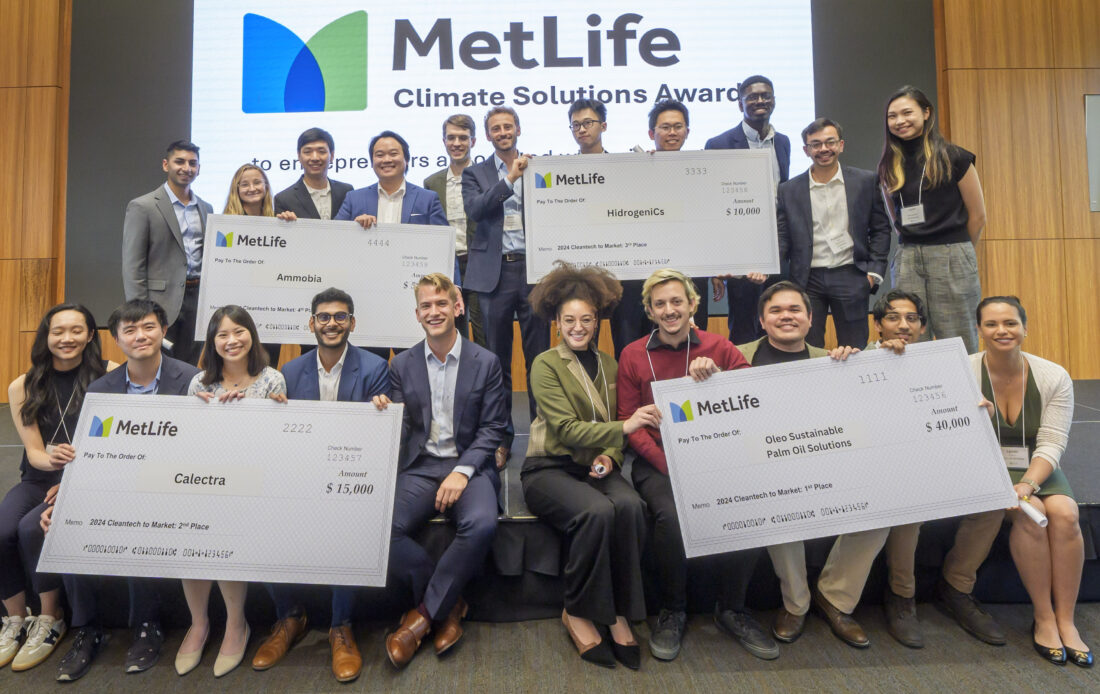A Berkeley Haas student team that worked to reduce the environmental impact of producing palm oil took top prize at the 2024 Cleantech to Market (C2M) Climate Tech Summit last week.

The 16th annual summit, held Dec. 6 at Haas, is the culmination of the 2024 program, which links graduate students from across UC Berkeley with startups and industry professionals to accelerate commercialization of cleantech solutions. The interdisciplinary student teams spend almost 1,000 hours working on strategic adoption of leading-edge technologies and investigating market opportunities, then present before a panel of judges. After the summit, the teams share 100-page reports with the entrepreneurs they’ve been supporting.
“C2M gave me high-level experience in science commercialization which I can use as I move forward with my own venture,” said Lynda Negron, MBA 25, a member of the winning team, Oleo Sustainable Palm Oil Solutions. Team members included Ricardo Kumelys and Samuel Nahusuly, both MBA 25, as well as Gautam Bordia, a PhD candidate in materials science and engineering, and Ayah Hassan, a PhD candidate in chemical engineering.
Oleo seeks to mitigate the carbon intensive production of oil seed crops, such as palm oil, which are among the world’s most carbon intensive commodities. The team presented potential use cases for transforming waste into sustainable oils for both the beauty industry and the aviation fuel industry.
Interim Dean Jennifer Chatman, in opening remarks at the summit, said C2M has grown over the years into a powerhouse program. Since 2015, the 61 C2M startups assisted through C2M have collectively raised more than $1.2 billion in funding and created more than 1,200 jobs to address the threats we face due to climate change, she said.
“C2M has transformed from a student-led pilot assisting scientists at Lawrence Berkeley National Lab back in 2008 to a marquis program that has forged tight alliances with government agencies, incubators, accelerators, and corporations across the country,” Chatman said.
Oleo received the top MetLife Climate Solution Award, receiving $40,000. The teams were judged by a panel including Andrew Campbell, executive director of the Energy Institute at Haas.
The C2M partnership program identifies startups with promising climate tech innovations, working with incubators and government programs to do so. The teams of graduate students from more than 20 disciplines across Berkeley are supported along the way with mentorship and expertise.
“This was the class I came to Haas for,” said Jas Schuldt, MBA 25, a member of team Calectra, which took second place, receiving $15,000. The opportunity to work with talented peers and teammates on the project was invaluable, he said. He added that the support the team received from industry mentors and C2M director Brian Steel was critical to their success. “Brian was just fantastic in providing advice,” Schuldt said.

Calectra’s technology emerged from startup co-founder and CTO Nate Weger’s, PhD 23 (Mechanical Engineering), heat transfer research at the Lawrence Berkeley National Laboratory.
Calectra’s student team included Joyce Chen, JD 26; Adrian Huang, a PhD candidate in chemistry; Vivaan Patel, a PhD candidate in chemical and biomolecular engineering; and N. Keira Jiang, an exchange MBA candidate from London Business School.
Hidrogenics came in third place, receiving $10,000, and included Remy Freire, MBA/MEng 25; Gary Chang, MBA/MS 25 (Development Practice); Kwabena Owusu Sarfo, MS 25 (Energy and Resources); Lynn Lin, an exchange MBA candidate from Columbia Business School; Yifan Wu, a PhD candidate in chemical engineering and energy conversion; and Pratiyush Singh, MEng 24, BS 22 (Civil and Environmental Engineering).
Hidrogenics also won the Hasler Cleantech to Market Award, the people’s choice award based on audience votes named after C2M sponsors Betty and Bill Hasler, a former Berkeley Haas dean.

Hidrogenics develops technology for the production of hydrogen and synthetic graphite, products that can be used in everything from public transportation to heavy industry.
The fourth-place team worked with Ammobia, a seed-stage startup out of Stanford that developed an ammonia separation method that can help decarbonize fertilizers, chemicals, marine shipping, and heavy industry.
The team included David Bishop, Jash Padhiar, and Carson Peacock, all MBA 25; Michael Bowen, a PhD candidate in chemical and biomolecular engineering; Wayne Zhao, PhD 22 (Materials Science and Engineering); and Alex Lei, MPP 25. Ammobia received $5,000.
Karen Baert, Ammobia’s CEO, praised the C2M program for giving students the chance to take real-world action in pursuit of a greener future.
“What a great way to inspire, educate, and channel some of our brightest young talent into climate tech,” she said.
Posted in:
Topics: